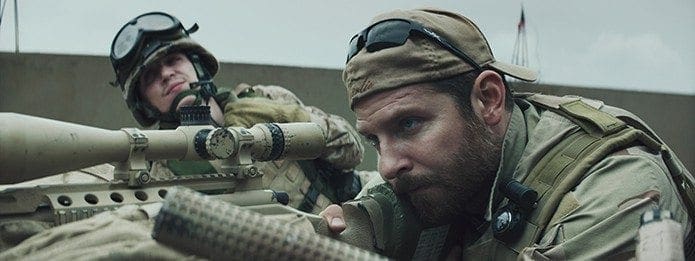 CNS photo/Warner Bros.
CNS photo/Warner Bros.New York
‘American Sniper’ depicts heroism, avoids larger issue of war
By CATHOLIC NEWS SERVICE | Published January 22, 2015
NEW YORK (CNS)—For those seeking an insight into an individual veteran’s perspective on the Iraq War, director Clint Eastwood’s sober drama “American Sniper” (Warner Bros.)—which stars Bradley Cooper as real-life Navy SEAL Chris Kyle—will likely hit home.
Yet moviegoers in search of a bigger-picture moral assessment of that conflict, or of armed clashes in general, may come away disappointed.
Drawing on Kyle’s 2012 memoir (written with Scott McEwen and Jim DeFelice), Eastwood and screenwriter Jason Hall trace the expert sharpshooter’s rise to celebrity status among his comrades. They also track his emergence as a prime target for enemy insurgents who eventually put a price on the Texas native’s head.
Determined to safeguard his fellow fighters—who dub him “the Legend” in recognition of his life-preserving prowess—Kyle insists on returning to combat through four grueling tours of duty. But his exposure to the moral and emotional pressures of urban warfare predictably exacts a psychological toll and places a strain on his relationship with his loving wife, Taya (Sienna Miller).
Scenes set during Kyle’s childhood show his forceful dad instilling the belief that people can be divided into three basic categories: predatory wolves, vulnerable sheep and protective sheepdogs. From the adult Kyle’s point of view, it’s enough to know that there are villains on the loose in Iraq—and innocent victims potentially at their mercy—for his chivalrous course of conduct as an aspiring member of the third grouping to become apparent.
While Eastwood successfully conveys Kyle’s personal heroism, his film avoids engaging the larger issue of whether the geopolitical cause to which Kyle repeatedly and resolutely lent his skills was an ethically valid one. In purely cinematic terms, moreover, the picture alternates between effectively displaying the consequences of Kyle’s scaring battlefield experiences and weakly relying on dialogue that can only hint at these same wounding repercussions.
Taken on its own terms and considered as a whole, however, Eastwood’s movie reliably escorts viewers through both the agonizing instantaneous dilemmas and the longer-term complexities that confronted the courageous warrior on whom its action centers.
The film contains stylized violence with some gore, a scene of torture, a premarital situation, some sexual humor and references, several uses of profanity and constant rough and crude language. The Catholic News Service classification is A-III—adults. The Motion Picture Association of America rating is R—restricted. Under 17 requires accompanying parent or adult guardian.
“The Wedding Ringer” (Screen Gems)
Lacking close friends, a likeable nebbish (Josh Gad) betrothed to a shallow beauty (Kaley Cuoco-Sweeting) engages the services of a best-man-for-hire (Kevin Hart) and a hastily assembled—and thoroughly motley—crew of fake groomsmen. Though it sketchily traces the burgeoning affinity between the husband-to-be and his stand-in bosom buddy, director and co-writer Jeremy Garelick’s potentially touching comedy bogs down in juvenile nastiness. Thus the script takes supposedly humorous swipes at the clergy abuse scandal and tries to garner giggles by involving a dog in a sex act. Anti-Catholic and irreverent humor, strong sexual content, including depraved activity with partial frontal nudity, a frivolous treatment of homosexuality, about a dozen uses of profanity, pervasive rough and crude language. The Catholic News Service classification is O—morally offensive. The Motion Picture Association of America rating is R—restricted. Under 17 requires accompanying parent or adult guardian.
“Taken 3” (Fox)
Framed for the murder of his ex-wife (Famke Janssen), a former covert agent (Liam Neeson) goes on the lam, tracked by the detective assigned to the case (Forest Whitaker) and by Russian mobsters (led by Sam Spruell) he suspects are the real culprits. Along with vindicating his innocence, the retired operative is out to protect his daughter (Maggie Grace) from becoming the gangsters’ next target. Director Olivier Megaton’s lackluster action sequel, which also features Dougray Scott as the rub-out victim’s second husband, fails to engage viewers sufficiently to make them care much about anyone on screen. Though the turmoil portrayed never gets bloody, Neeson’s character recklessly endangers pursuing police as well as civilian bystanders in his efforts to evade capture. Considerable action violence with minimal gore, a premarital situation resulting in pregnancy, adult dialogue including a possible reference to abortion, a half-dozen uses of profanity, at least one rough and several crude terms. The Catholic News Service classification is A-III—adults. The Motion Picture Association of America rating is PG-13—parents strongly cautioned. Some material may be inappropriate for children under 13.
“Blackhat” (Universal)
A computer hacker (Chris Hemsworth) serving time in federal prison can win his freedom by helping a team of Chinese and American investigators—including Wang Leehom, Tang Wei and Viola Davis—track down the programmer responsible for a lethal cyberattack on a nuclear power plant. Director Michael Mann’s characteristically stylish, moody crime portrait succeeds up to a point thanks to kinetic visuals that suit the morally shaded material. Yet, while free of grossly offensive elements, the film ultimately turns out to be a standard action-thriller that glorifies physical violence and unintentionally demonstrates that hacking is far from a novel or elevated form of criminality. Considerable, moderately graphic, action violence, a mostly implied premarital sexual relationship, some crass language. The Catholic News Service classification is A-III—adults. The Motion Picture Association of America rating is R—restricted. Under 17 requires accompanying parent or adult guardian.